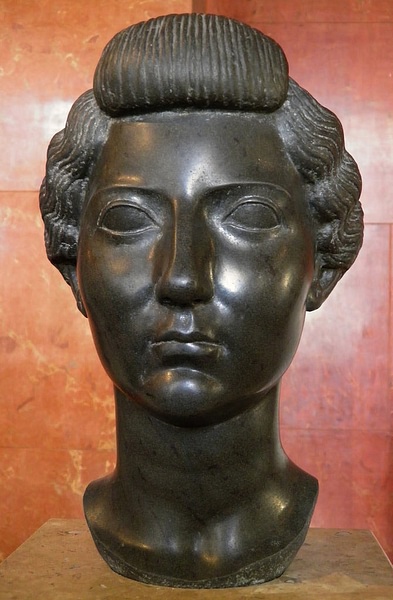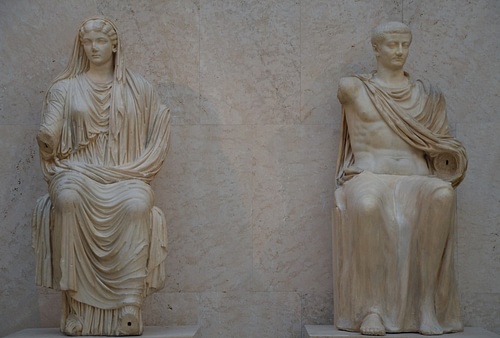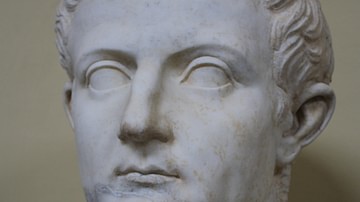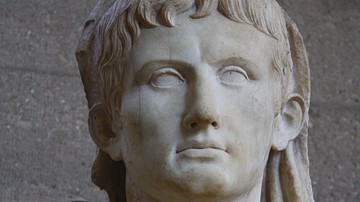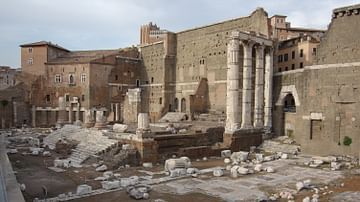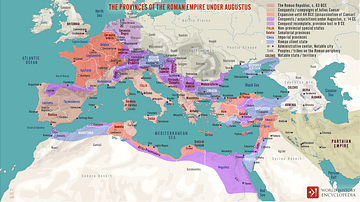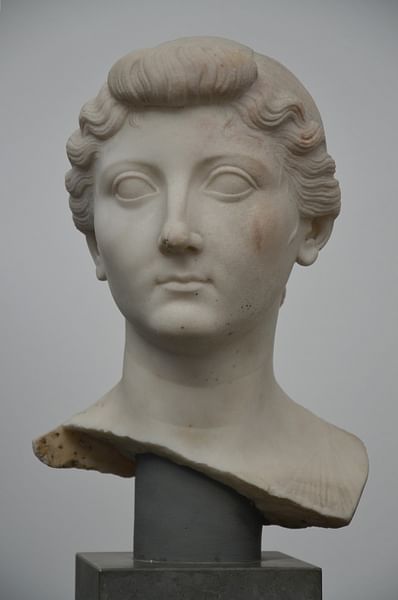
Livia Drusilla (58 BCE - 29 CE) was the third wife of emperor Augustus of Rome, mother of emperor Tiberius, and grandmother of emperor Claudius. She was one of the great women in history who achieved prominence living in the shadow of a strong leader, serving silently as his advisor and confidant. Supportive of her husband's reform policies, as well as turning a blind eye to his infidelities, she served the empire as a symbol of the loyal Roman wife, yet behind the scenes at the imperial court, she spent much of her adult life ensuring her son's future as heir to Augustus's throne whether he wanted it or not.
Augustus rises to power
Although known to many in his youth as Octavian, the adopted-son of Julius Caesar, the young Augustus would eventually come to power after the assassination of his father, becoming leader of an empire that stretched from Gaul in the north, westward to Spain, eastward to Syria and southward to northern Africa, encircling the entire Mediterranean Sea. To achieve this he had endured years of civil war, eventually defeating Mark Antony and Cleopatra at the Battle of Actium and sending fellow triumvirate Lepidus into exile. Returning to Rome and its people a hero, the Roman Senate granted him unlimited 'principate' power. His many reforms and innovations as emperor transformed Rome from a weak, dying Republic to a strong and dominating empire - he famously said late in life, "I found Rome built of sun-dried bricks. I leave her clothed in marble" (Life of Augustus, XXIX).
In his long and active life, Augustus would marry three times, only once for love. His first wife was Mark Antony's step-daughter Claudia by his wife Fulvia - this was purely a political alliance, and the marriage was never consummated. After they divorced, he married the much older Scribonia, another political alliance; however, she would give birth in 39 BCE to his only child, a daughter named Julia. Augustus was quoted as saying he divorced her - the day after Julia's birth - because he could not bear the way she nagged him. Livia Drusilla would be his third wife.
Early life & marriage to Augustus
While much of her early life remains unknown - not uncommon for women at that time - Livia was born January 30, 58 or 59 BCE probably in Rome. Before she married Augustus, she had been married to Tiberius Claudius Nero, a member of the very old and prominent Claudian clan. Unfortunately, her husband did not choose his political alliances wisely, he not only sided with the optimates - the conservative branch of the Senate - but also supported Mark Antony at Philippi. Livia would follow her husband, with their son Tiberius in tow, into exile in Greece, returning to Rome in 39 BCE. She would have two children by Tiberius Nero; the future emperor Tiberius born in 42 BCE, and Nero Claudius Drusus, father of the future emperor Claudius. Livia was pregnant with Drusus when she divorced her husband to marry Augustus in 37 (or 38) BCE. This marriage would unite two prominent clans, the Julians (the family of Augustus) and the Claudians (the family of Livia by marriage).
For Augustus, this marriage was, for all intended purposes, a wise decision. Livia would be a strong supporter of her husband while maintaining a low profile. And to the people of Rome, she would be seen as a "model of old-fashioned propriety" with intelligence, beauty, and dignity. Since Augustus respected her opinion, she was considered by many inside and outside the imperial court as having a significant influence on her husband's administrative affairs. She was also considered very generous, encouraging Augustus to be merciful to his political opponents. Unfortunately, there were some within the imperial court that had other opinions - to them she was a ruthless intriguer. Her step-grandson Gaius said she had a sharp tongue, calling her "Ulixes stolatus" or "Ulysses (Odysseus) in a frock."
Although she always claimed to have little impact on her husband's decisions, the contemporary historian Tacitus in his The Annals spoke of her "secret intrigues." He wrote "…she had gained such a hold on the aged Augustus that he drove out as an exile into the island of Planaxia, his only grandson Agrippa Postumus, though devoid of worthy qualities, and having only brute courage of physical strength, had not been convicted of any gross offense" (5-6).
Family affairs
Like many Roman wives, Livia's official duties were mostly concerned with domestic matters —- overseeing the running of the house and the education of her children and grandchildren. Since there was no emperor's palace, the emperor and his wife lived in a house on Palatine Hill adjacent to the Temple of Apollo. Their home served as both a private and official residence. However, there were a number of advantages to being the wife of the emperor - certain legal privileges. Besides front-row seats at the theater, she had financial independence as well as freedom from verbal or physical attack - sacrosanctity or inviolability. She was known as Romana princips, something similar to a first lady. However, while she remained supportive of her husband, her primary concern was to ensure that one of her sons - Tiberius or Drusus - would be heir to the throne.

Livia had good reason to be concerned about Augustus's heir. Although Julia had given him nothing but trouble throughout her life (she would eventually be exiled), his only daughter had given birth to two daughters, Julia and Agrippina, and three sons. Her sons, Gaius, Lucius and Agrippa Postumus (so named because he was born after his father's death), were all considered possible heirs to the throne, and since they were related to Augustus directly through Julia (not adopted), they stood ahead of Livia's sons Tiberius and Drusus.
Julia had been married, arranged of course, to Gaius Claudius Marcellus, the 17-year-old nephew of Augustus. After his untimely death, she married Marcus Vipsanius Agrippa, Augustus's friend and fellow commander who had been forced to divorce his wife to marry Julia. Her marital luck would continue for Agrippa would die in 12 BCE. However, their marriage gave Augustus three possible heirs to the throne.
One heir remains
Whether it was scheming on her part or luck, Livia's promotion of her sons would ultimately be successful. Death would bring Tiberius to the throne. First, Livia lost her youngest son Drusus in 9 BCE when he died in battle after a fall from his horse. Next, although relatively young, Gaius and Lucius would also soon die; Gaius in 4 CE at the age of 23 having been wounded in battle, and Lucius of an illness in 2 CE in Gaul at the age of 19. Although neither was in Rome at the time, history has still questioned whether or not 'not scheming' Livia had any role in their deaths. The third son, Agrippa Postumus, while still very young was exiled, and despite having been adopted by the emperor, he would be executed shortly after Augustus's death.
Oddly, the empire would one day be ruled by the descendants of Drusus who was the father of one future emperor of Rome and the grandfather of another. Drusus had two sons, the distinguished commander Germanicus, father of the ignoble Caligula who would rule Rome from 37 to 41 CE, and Claudius who governed from 41 to 54 CE. Poor Claudius. His grandmother Livia treated Claudius with total contempt for he limped, stuttered, and drooled. She could not bear to look him in the face. When it was predicted that Claudius would one day rule the empire, she 'prayed aloud that the Roman people might be spared so cruel and undeserved a misfortune.' Many believe the popular Germanicus who died in 19 CE at the age of 34 had been poisoned at the orders of Tiberius to eliminate any possible threat to his reign.
The untimely deaths of Lucius and Gaius brought Tiberius to the forefront, even though Augustus was less than willing to name Tiberius as his heir. Tiberius always claimed that the emperor treated him shabbily. Concerning Tiberius emergence as the next emperor, Tacitus wrote,
When Agrippa died, and Lucius Caesar as he was on his way to our armies in Spain, and Gaius while returning from Armenia, still suffering from a wound, were prematurely cut off by destiny, or by their step-mother's treachery, Drusus, too having long been dead, Nero (meaning Tiberius Nero) remained alone of the step-sons and in him everything tended to centre. (5)
While Livia worked to ensure one of her sons would become emperor, she never seemed to have discussed the matter with the eldest, Tiberius. Even though he had distinguished himself in both politics and in the field, he felt completely out of place in the imperial house. At one point he had even exiled himself to Rhodes only returning to Rome in 2 CE. He claimed he had grown "weary of office and needed rest." Augustus called it desertion. His mother, however, had other plans for her son. She had to guarantee his place as a legitimate heir. To accomplish this Tiberius was forced to divorce his beloved wife, the pregnant Vispania Agrippina, and marry the now widowed Julia in 12 BCE. He actually hated Julia and may have escaped to Rhodes to avoid her. However, despite his feelings, he defended Julia when Augustus had her exiled. Later, Tiberius was adopted in 4 CE, although in his forties, by Augustus. He was now in line to be the lone heir to the Roman throne.
Last years of Livia
On August 19, 14 CE Augustus died. Augustus and Livia were out of Rome at the time of the emperor's death, over 100 miles away. In the years prior to his death, his health was failing, Augustus became more and more withdrawn, communicating with his wife only through letters. There are those who claim the date of his death to be in error because Livia may have purposely delayed announcing his demise because Tiberius was also out of Rome, a full five days away. As with the deaths of her step-sons, many historians believe Livia could have had a role in the emperor's death, having served him poisoned figs.
As Augustus lay dying, his wife stayed by his side, governing all who saw the emperor, sending out bulletins about his health. Tacitus wrote, "For Livia had surrounded the house and its approaches with a strict watch, and favourable bulletins were published from time to time …" (6). Following Tiberius's arrival, the emperor's death was announced. In his will, Augustus gave the bulk of his estate to Livia and Tiberius. He also adopted Livia; she, therefore, became Augusta. Afterwards, Tiberius would tire of his meddling mother, removing her from all public affairs. He may have even exiled himself to Capri to get away from her.
Livia would die at the age of 86 in 29 CE; her son would outlive her by eight years. Whether or not she had a role in her husband's death or even the deaths of her step-grandchildren is better left to others to argue. History remembers her as a powerful woman who stood beside her emperor husband but still removed all obstacles that would have prevented her son Tiberius to sit on the throne. A member of the Julio-Claudian clan would rule the empire until 68 CE when Claudius's adopted son Nero committed suicide. The empire would somehow endure the reigns of Tiberius, Caligula, Claudius and Nero. None had achieved the greatness of their distinguished ancestor Augustus.
